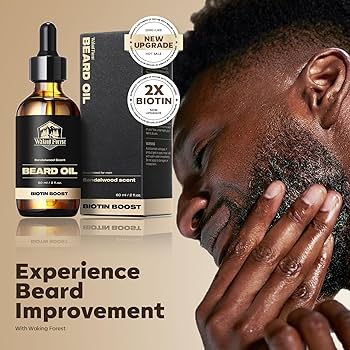Rosemary oil, with its aromatic fragrance, has been coveted for centuries for its various health benefits.
From boosting memory to relieving stress, this herbal elixir has proven its worth in numerous aspects.
However, when it comes to beard growth, the story takes an unexpected twist.
While rosemary oil has been known to promote scalp hair growth, there are talks that it might hinder the luscious growth of beard hair.
In this short guide, we dive into the captivating realm of rosemary oil and its relationship with beard growth.
rosemary oil for beard growth
Using rosemary oil for beard growth may not be effective and could possibly hinder growth instead of promoting it.
While rosemary oil is known for its antioxidant and antimicrobial properties, it has been shown to be effective in promoting scalp hair growth, but not facial hair growth.
Therefore, it is not recommended to apply rosemary oil to the beard in hopes of enhancing growth.
It is important to consider the potential drawbacks and side effects of using rosemary oil for beard growth before attempting to do so.
Key Points:
- Rosemary oil may not be effective for promoting beard growth and might even hinder it.
- The effectiveness of rosemary oil is limited to promoting scalp hair growth, not facial hair growth.
- Applying rosemary oil to the beard is not recommended for enhancing growth.
- It is crucial to consider the potential drawbacks and side effects of using rosemary oil for beard growth.
- Rosemary oil is known for its antioxidant and antimicrobial properties.
- Research suggests that rosemary oil may not be effective for beard growth.
rosemary oil for beard growth – Watch Video
💡
Pro Tips:
1. Rosemary oil has been used for centuries to promote beard growth and thickness. It is believed to stimulate hair follicles and improve blood circulation to the face.
2. In ancient Greece, rosemary was considered a symbol of remembrance. Students often wore wreaths of rosemary while studying to enhance their memory and concentration.
3. The scientific name for rosemary, Rosmarinus officinalis, translates to “dew of the sea.” This name reflects the plant’s natural habitat in coastal areas of the Mediterranean region.
4. During the Renaissance period, rosemary was used as a natural insect repellent and was often placed under pillows to ward off pests such as fleas and moths.
5. Rosemary oil contains antioxidants that can help nourish and strengthen the hair. It is commonly used in hair care products and can also help reduce dandruff and promote a healthier scalp.
Rosemary Oil For Beard Growth: A Promising Solution?
Beards have long been a symbol of masculinity and are often linked to self-expression and confidence. For those seeking to enhance their beard growth, the search for effective solutions can be never-ending.
One such solution that has gained attention is rosemary oil. Known for its antioxidant and antimicrobial properties, rosemary oil has been researched for its potential to promote hair growth on the scalp. However, when it comes to beard growth, the results are not as promising.
In fact, there is evidence suggesting that applying rosemary oil to the beard could hinder growth instead of promoting it.
Improvements:
- Beards are often associated with masculinity, self-expression, and confidence.
- Searching for effective solutions to enhance beard growth can be a never-ending process.
- Rosemary oil has gained attention as a potential solution for promoting hair growth.
- Rosemary oil is known for its antioxidant and antimicrobial properties.
- Research has shown that rosemary oil promotes hair growth on the scalp.
- However, when it comes to beard growth, rosemary oil may have limited effectiveness.
- There is evidence suggesting that applying rosemary oil to the beard could hinder growth instead of promoting it.
“The search for effective solutions for enhancing beard growth can be never-ending. Rosemary oil has gained attention for its potential to promote hair growth on the scalp, thanks to its antioxidant and antimicrobial properties. However, when it comes to beard growth, there is evidence suggesting that applying rosemary oil could hinder growth instead of promoting it.”
Antioxidant And Antimicrobial Properties Of Rosemary Oil
Rosemary oil is derived from the leaves of the Rosmarinus officinalis plant. This essential oil has been extensively researched for its antioxidant and antimicrobial properties. Antioxidants are essential in protecting the body’s cells from damage caused by free radicals, which can contribute to hair loss. Conversely, the antimicrobial properties of rosemary oil can help combat bacteria and fungi that may hinder hair growth. Therefore, rosemary oil is a fascinating option for individuals seeking natural remedies for hair-related concerns.
Promoting Scalp Hair Growth: Rosemary Oil Vs. Minoxidil 2%
Studies have shown that rosemary oil can be effective in promoting scalp hair growth. Research has demonstrated that rosemary oil performs comparably to Minoxidil 2%, a commonly used medication for treating hair loss.
This finding has sparked excitement and led some individuals to consider rosemary oil as a potential solution for their beard growth concerns.
- However, it is crucial to note that the effects of rosemary oil on scalp hair growth may not necessarily translate to its effects on beard growth.
The Unexpected Outcome: Rosemary Oil And Beard Growth
While rosemary oil has shown promise in promoting scalp hair growth, the same cannot be said for beard growth. Surprisingly, applying rosemary oil to the beard could hinder growth instead of stimulating it. It is believed that the excessive antimicrobial properties of rosemary oil could disrupt the balance of the beard’s microbiome, leading to potential follicle damage or inhibition.
This unexpected outcome suggests that caution should be exercised before incorporating rosemary oil into one’s beard care routine.
- Rosemary oil promotes scalp hair growth
- Rosemary oil does not promote beard growth
- Excessive antimicrobial properties of rosemary oil may disrupt the beard’s microbiome
- Caution should be exercised before using rosemary oil on the beard.
The Potential Hindrance: Applying Rosemary Oil To The Beard
The use of rosemary oil on the beard may pose a potential hindrance due to its antimicrobial properties. While these properties can be beneficial in preventing the growth of harmful bacteria and fungi, they may also have a negative impact on the beneficial microorganisms that are essential for maintaining a healthy environment for hair follicles to grow. This delicate balance is crucial for promoting beard growth. Therefore, it is important to carefully consider the potential consequences before applying rosemary oil to the beard.
- Applying rosemary oil can help ward off harmful bacteria and fungi.
- However, it may also harm beneficial microorganisms on the skin.
- These microorganisms are important for maintaining a healthy environment for hair follicles.
- Disrupting this balance may hinder beard growth.
It’s important to consider the potential consequences before using rosemary oil on the beard.
Benefits Of Using Rosemary Oil For Beard Growth
While rosemary oil may not be the ideal solution for beard growth, it still carries several potential benefits. The antioxidant properties of rosemary oil can help reduce oxidative stress, which may indirectly support beard health. Additionally, the antimicrobial properties of rosemary oil may help prevent bacterial or fungal infections that could negatively impact the beard. Furthermore, the aromatic properties of rosemary oil can provide a pleasant scent to the beard, enhancing the overall grooming experience.
Drawbacks Of Using Rosemary Oil For Beard Growth
Despite its potential benefits, rosemary oil for beard growth has notable drawbacks. The most significant drawback is the potential inhibition of beard growth due to the excessive antimicrobial properties of rosemary oil. Additionally, rosemary oil may not be suitable for individuals with sensitive skin, as it can cause irritation or allergic reactions. It is essential to perform a patch test before applying rosemary oil to the beard and discontinue use if any adverse effects occur.
- Excessive antimicrobial properties of rosemary oil may hinder beard growth
- Rosemary oil can cause irritation or allergic reactions in individuals with sensitive skin
- Perform a patch test before applying rosemary oil to the beard
- Discontinue use if any adverse effects occur.
Side Effects To Consider: Using Rosemary Oil For Beard Growth
In addition to potential skin irritation, there are other side effects to consider when using rosemary oil for beard growth. Ingesting large amounts of rosemary oil may lead to digestive issues, such as an upset stomach or heartburn. Moreover, topical application of rosemary oil may cause a tingling or warming sensation on the skin, which can be uncomfortable for some individuals. It is crucial to be mindful of these potential side effects and use rosemary oil for beard growth with caution.
In-Depth Analysis: Rosemary Oil And Its Effects On Beard Growth
To better understand the effects of rosemary oil on beard growth, further scientific studies specifically focused on this topic are necessary. While there is existing research on its impact on scalp hair growth, more investigations are warranted to determine whether the antimicrobial properties of rosemary oil are solely responsible for potentially hindering beard growth or if other factors are at play.
Improvements:
- Better understand the effects of rosemary oil on beard growth
- Further scientific studies specifically focused on this topic are necessary
- Current research has primarily focused on its impact on scalp hair growth
- Determine if the antimicrobial properties of rosemary oil hinder beard growth solely or if other factors are at play.
Understanding The Pros And Cons: Rosemary Oil For Beard Growth
Rosemary oil may not be the optimal solution for promoting beard growth. While its antioxidant and antimicrobial properties have shown promise in promoting scalp hair growth, applying rosemary oil to the beard could hinder growth instead.
Caution should be exercised before using rosemary oil for beard growth, as it may disrupt the delicate balance of the beard’s microbiome.
Nevertheless, rosemary oil still offers potential benefits for beard health, such as its antioxidant properties and pleasant scent.
To summarize, it is crucial to weigh the pros and cons before incorporating rosemary oil into one’s beard care routine.
–Rosemary oil may not be optimal for beard growth
–Antioxidant and antimicrobial properties promote scalp hair growth
–Applying rosemary oil to beard could hinder growth
–Caution should be exercised due to potential disruption of beard’s microbiome
-*Rosemary oil offers potential benefits for beard health, such as antioxidants and pleasant scent
💡
You may need to know these questions about rosemary oil for beard growth
Is rosemary oil good for beard growth?
Yes, rosemary oil is beneficial for beard growth due to its ability to stimulate blood circulation. A healthy blood supply plays a crucial role in supporting facial hair follicle growth and maintenance. By promoting better blood circulation, rosemary oil ensures that more essential nutrients are delivered to the follicles, consequently promoting beard growth.
Is rosemary better than minoxidil for beard?
While scientific studies suggest that rosemary oil and minoxidil can both be effective for promoting hair growth, some studies indicate that rosemary oil may have comparable effectiveness to minoxidil in treating androgenetic alopecia, with potentially fewer reported side effects. Rosemary oil is a natural alternative that has been used for centuries for its medicinal properties and may be a preferred option for individuals looking for a more holistic approach to hair growth. However, it’s worth noting that individual results may vary, and it’s always recommended to consult with a healthcare professional before making any decisions about hair growth treatments.
Is rosemary better than minoxidil?
Rosemary essential oil has proven to be a promising alternative to minoxidil for treating androgenetic alopecia. In a study conducted on individuals with male or female pattern baldness, the effectiveness of rosemary essential oil was found to be on par with minoxidil. Moreover, one notable advantage of rosemary essential oil was its ability to alleviate the uncomfortable side effect of an itchy scalp more effectively than minoxidil. Therefore, for those seeking a natural and gentle solution for hair regrowth, rosemary essential oil may be a preferable choice over minoxidil.
How long to leave rosemary oil in hair for growth?
For optimal hair growth, it is recommended to leave rosemary oil diluted in your hair for a duration of 30 minutes to an hour before washing it as part of your regular hair care routine. However, to maximize effectiveness, leaving it in for 2 to 6 hours has shown the best results. It is advised to repeat this process up to twice a week for the desired outcome.
Reference source
https://wimpoleclinic.com/blog/rosemary-oil-for-beard-growth/#:~:text=A%20healthy%20blood%20supply%20is,follicles%2C%20helping%20promote%20beard%20growth.
https://scandinavianbiolabs.com/blogs/journal/rosemary-oil-vs-minoxidil#:~:text=to%20hair%20regrowth.-,Effectiveness,with%20fewer%20reported%20side%20effects.
https://www.healthline.com/health/rosemary-oil-for-hair#:~:text=Both%20were%20used%20on%20human,scalp%20more%20successfully%20than%20minoxidil.
https://nikura.com/blogs/discover/rosemary-oil-for-hair-the-benefits-and-how-to-use-it#:~:text=How%20to%20apply%20rosemary%20oil,a%20week%20for%20best%20results.
Table of Contents




